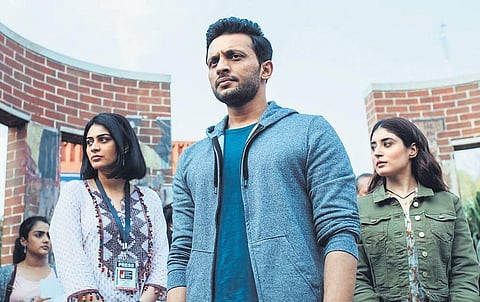

At the 2018 Oscars red carpet, Get Out star Daniel Kaluuya had shut down a reporter who described the film as ‘ticking a lot of boxes’. That exchange came to my mind, in an unflattering way, while watching the initial episodes of Tandav. Schlocky and derivative, it’s the kind of show that’s precisely concerned with ticking a lot of boxes. The inspiration, clearly, are Western dramas that reflect the political tempers of their time. But Tandav is too glib and lightweight. Like a visiting speaker at a rally, it’s happy to name-check and leave.
The show kicks off with farmers protesting a forthcoming chemical factory. There’s a clash, and two Muslim boys are gunned down in a shootout, while an arrest is issued for a third. Back in Delhi, incumbent PM Devki Nandan (Tigmanshu Dhulia) is awaiting election results. His son, Samar Pratap Singh (Saif Ali Khan), is on the rise — cause for concern for Anuradha (Dimple Kapadia), Devki’s mistress, and Gopal Das (Kumud Mishra), a senior party member. The various factions are shown bidding for power, especially Samar, who has deep ambitions of succeeding his father.
Now, I have only scratched the surface of the first episode, but that’s enough to ascertain the perimeter director Ali Abbas Zafar has set for himself. This is a show obsessed with the base mechanics of power. It confuses silly power games — full of killings and double-crossings — with actual statecraft. Any context, thus, is mere window-dressing for the makers.
The co-opting begins early on, with Mohammed Zeeshan Ayyub parodically cast as a student activist at ‘Vivekananda National University’ (VNU). Zeeshan’s Shiva is clearly modelled on Kanhaiya Kumar — we see him chant Azaadi slogans in campus and free his activist friend from jail — though the show tries to mask it in absurd ways. “I’m not cut out for politics,” he announces sheepishly to his peers, before getting bound up in a facile love arc.
Tandav’s shallow interpretation of student politics gets more grotesque. There’s a scene where Shiva and his friends clash with their opposite number — a mirroring of the 2020 JNU attack, here presented as the result of a simple misunderstanding. The condescension is extended to the national level: everything from caste politics to demonitisation is mentioned, then forgotten for the next best thing. It’s all the more depressing that the writer here is Gaurav Solanki, who showed great depth and subtlety in Article 15 (2019).
The show has other flaws. A good political thriller is built on intrigue, making us feel like co-conspirators in the game but also keeping us on tenterhooks. In Tandav, we are privy to every maneuver and gambit at play. The audience is always kept two steps ahead of the characters — their shocks aren’t our shocks, their surprises aren’t our surprises. Equally awkward is the lack of a clear side to root for: Samar is cynical but overbearing, Shiva is idealistic but unwise.
Dimple Kapadia and Zeeshan Ayyub are fine actors wasted in grim, cardboard parts. Only Sunil Grover manages to stand out as Samar’s aide-de-camp — though this means he’s permanently wearing dark glasses and chain-smoking himself to death. Among the others, Kritika Kamra holds her own as Shiva’s troubled girlfriend, while Gauhar Khan is fetching as a keen bureaucrat.
The dearth of a massive political thriller was long felt in Indian streaming. That gap is now filled by a show that hardly rises to the occasion. Only recently we were celebrating the migration of big Bollywood stars and directors to OTT. Yet it now appears they have brought their corruptions with them.